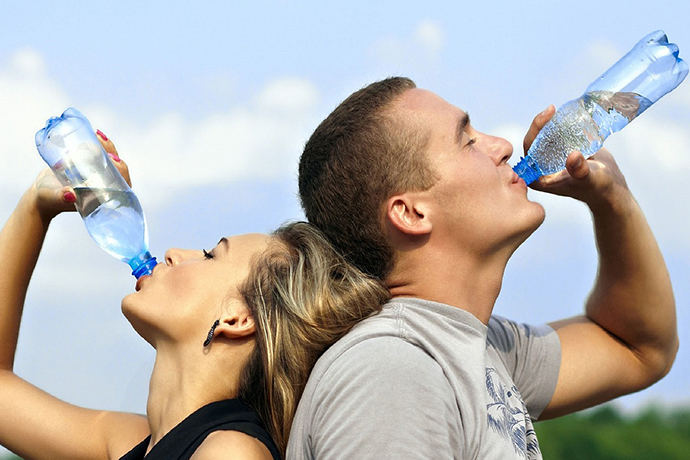In hot weather, simply drinking water isn’t enough. You also need to understand how your body loses and retains water. As temperatures rise, your body sweats more to cool down. This means you lose water and essential chemicals. To stay healthy, alert, and maintain stable energy levels, you need to stay hydrated. This article explores some natural and effective ways to stay hydrated in the summer, avoiding sugary or low-quality drinks.
Understand why staying hydrated in hot weather is so important
About 60% of your body is made up of water, and all your cells, tissues, and organs need it to function properly. In hot weather, your body has to work harder to maintain a constant body temperature, which causes you to sweat more. Besides water, you also lose chemicals like sodium, potassium, and magnesium through sweat. These substances are essential for muscle growth and energy production. Without replenishing fluids, dehydration can lead to fatigue, dizziness, muscle cramps, and even heatstroke. That’s why learning how to stay hydrated naturally is crucial, not only for feeling good, but also for staying healthy and safe in hot weather.
Drink water regularly throughout the day
Drinking large amounts of water at once isn’t as good for your health as drinking smaller amounts throughout the day. If you drink too much at once, your body can quickly excrete it, causing you to absorb less fluid. It’s a good idea to drink a glass of water upon waking, before each meal, and before bed. Keeping a reusable water bottle handy can help you remember to drink regularly. Adding cucumber slices or a few drops of lemon juice makes water taste better and helps you feel more hungry.
To hydrate naturally, eat foods rich in water
Adding water to your diet is one of the easiest and best ways to improve your health. Many fruits and vegetables are primarily water, but they also contain vitamins and minerals that help the body absorb and use water effectively. Foods like cucumbers, tomatoes, oranges, strawberries, celery, and lettuce are good choices in hot weather. Snacking on these foods throughout the day not only helps you stay hydrated but also replenishes vitamins that help your skin and immune system withstand the heat.
Balance Electrolytes Naturally
In hot weather, you lose more than just water; you also lose electrolytes, which help keep muscles and nerves functioning properly. Instead of buying store-bought sports drinks loaded with sugar and chemicals, you can make your own. Coconut water, rich in potassium, magnesium, and sodium, is a good choice. You can also make a simple electrolyte drink at home with equal parts water, sea salt, honey, and lemon juice. This mix can naturally improve your body’s fluid balance without the use of medications or refined sugar.
Avoid dehydrating beverages
Not all beverages are good for you. Coffee, spirits, and sugary beer can worsen dehydration by accelerating fluid loss. Drinking small amounts of coffee or tea is fine, but it’s important to drink enough fluids to maintain your fluid balance. For example, drink an additional cup of water for every cup of coffee. Avoiding or limiting processed, sugary beverages can also help your body better regulate fluids, as they can raise insulin levels and disrupt your body’s natural fluid balance.
Look good and stay cool
How quickly you dehydrate depends on your clothing. Wearing light-colored, loose-fitting, breathable clothing can help minimize sweating and keep your body temperature stable. Outdoors, a hat and sunglasses can block direct sunlight and reduce the risk of excess fluid loss through sweating. If possible, stay in the shade during the hottest part of the day (usually between 11:00 AM and 3:00 PM). This reduces the burden on your cooling system.
Learn your body’s thirst signals
Many people wait until they’re actually thirsty to drink water, but thirst can also be a sign of dehydration. Instead, learn to recognize the early warning signs, such as dry lips, fatigue, dizziness, or dark urine. Being proactive can help prevent thirst before it even occurs. The color of your urine (which should be light yellow) is another way to determine whether you’re drinking enough water. If you’re heavier, you’ll obviously need more water.
Frequently Asked Questions
1. How much water should I drink in hot weather?
Aim for 2.5 to 3 liters of water per day, but this depends on your activity level and body type. If you sweat a lot or spend a lot of time outdoors, you should drink more.
2. Can I drink juice to stay hydrated?
Unsweetened juices can help you stay hydrated, but avoid these drinks. It’s best to mix juice with water or choose fruits with a high water content.
3. Is water better than coconut water?
Coconut water can help replenish electrolytes lost through sweat, but it shouldn’t replace drinking plain water. It’s best to drink coconut water as a supplement, especially after exercise or outdoor activities.
4. How do I know if I’m thirsty?
Fatigue, dry mouth, dark urine, dizziness, or a headache are all signs of thirst. If these signs occur, you should rehydrate immediately.
5. What about herbal tea? Is it good for you?
Yes, caffeine-free herbal teas, such as hibiscus, peppermint, or chamomile, can help you stay hydrated all day, helping you relax and fight free radicals.
In short
Staying refreshed in hot weather isn’t difficult. Staying hydrated is easy by drinking enough water, eating water-rich foods, getting electrolytes from natural sources, and making smart lifestyle choices. Remember: staying hydrated isn’t just about quenching your thirst; It protects your health, keeps your energy levels stable, and helps your body maintain its natural balance. Your body will adapt better to its natural hydration methods, no matter how hot it is outside. This will leave you feeling refreshed, energized, and energetic.




